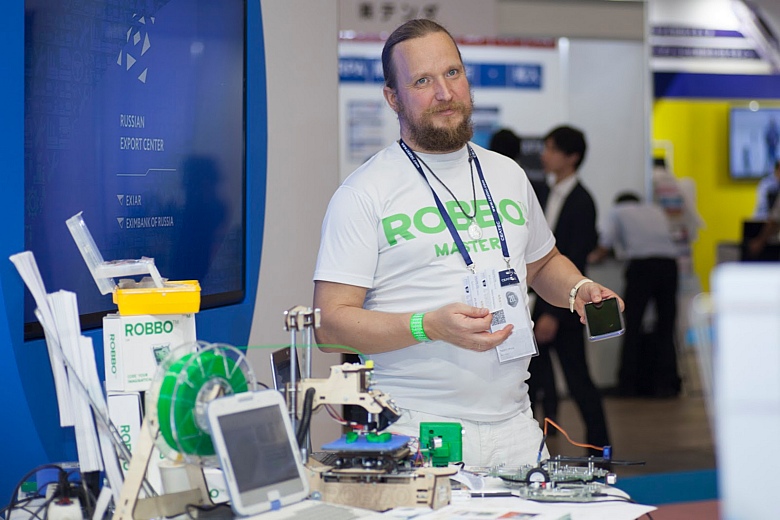
Pavel ate a dog while teaching children of different ages complex technical concepts. Under the cut - about how best to present technical knowledge to a child, as well as his personal approach to school education.
But first, a few words about "ROBBO". Initially, it is a developer and manufacturer of educational robotics on free software and hardware. Leadership project of the Agency for Strategic Initiatives (ASI). In fact, they developed their products with the support of the Innovation Promotion Fund.
With the help of ROBBO, 50,000 children study in 130+ ROBBOClub.Ru clubs and in more than 300 schools in 20 countries of the world (USA, Europe, CIS, Asia).
ROBBO has twice won the Google RISE Awards, the Finnish government competition (FinLanding) and the Japanese government competition (Fukuoka Startup Day). And to the heap she received an award from the government of St. Petersburg for the best innovative product and the title "Best social project - 2018". Well, Pavel Frolov is the creator and inspirer of this whole story.
- Let's start with the main question: do you have a ready-made recipe for captivating, say, a five-year-old child with technology?
- Of course, no one will offer you a ready-made step-by-step instruction that would suit any occasion. But the study of technology should be approached from the same perspective as any other subject - with interest. It is necessary to show, for example, that it is much more interesting not to play computer games, but to create them. And of course, we must act consistently. Children of this age in our clubs first play with technology, then begin to study them, and then create.
- Is there a basic set of knowledge required at the start for development in this area?
- Knowledge in the field of programming, circuitry and microelectronics is primary here. Skills of working with components of electronic devices, programming of electronic devices, including robots, are important.
- How early can you learn programming and where to start?
- In our educational institutions, my five-year-old children and I study the visual programming language Scratch, which is the basic one for learning "adult" languages.

The Scratch 3.0
Scratch editor interface helps lay the foundations for composing algorithms and approaches. At this stage, it is important to develop logic and mathematical thinking. And also understand the basics of creating components of any program (coding, debugging, unit and integration testing).
When the child is not yet able to read, you can start with Scratch Junior, add a 3D pen and various constructors to develop motor skills and logic. It is important to understand that you should not give something serious.
From the age of 7, Scratch, Arduino are ideal. When Scratch's capabilities are exhausted (this is 10 years or more), you can switch to Arduino IDE, Python, C # and whatever your heart desires.
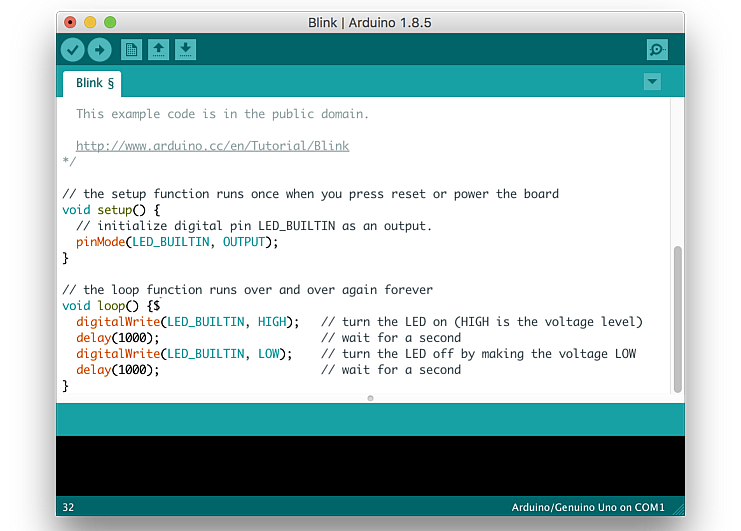
Screenshot of Arduino IDE with sample code
By controllers this is ESP and advanced Arduino versions. What exactly to choose in a particular case depends on the task. For some, pure languages are well suited, for others - game engines, emulators, frameworks and many, many things.
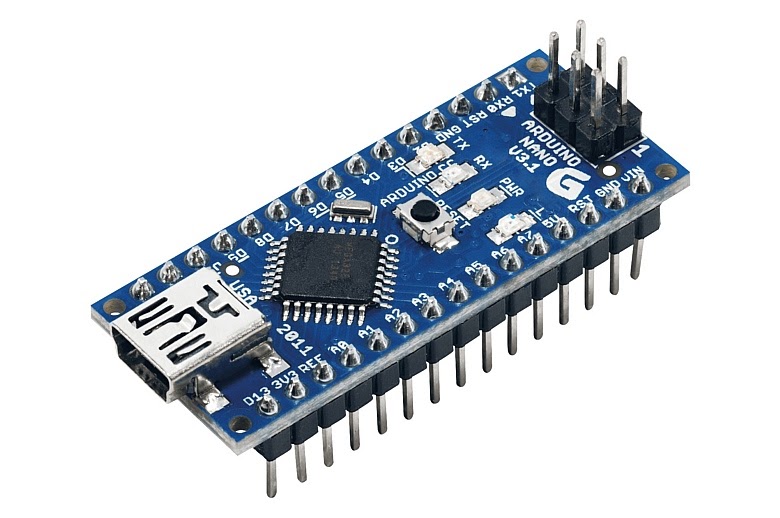
One of the popular versions of Arduino is the Arduino nano microprocessor board
- All the platforms you recommend are widely available. Why is it that we still don't have a craze for robotics comparable to computer games?
- Arduino, Scratch are still not as available and widespread as computer games. Every student knows about games. They involve each other, and the parents do not have to make any effort to keep the child occupied. In programming and robotics, the opposite is true: children learn about these areas mainly from adults - from parents who bring their children to a circle or an online course, or from an advanced technology teacher. To master the same Arduino and Scratch, you need help and explanations from adults. As a result, in order to get carried away, both parents and children need to make more effort than they spend when they just download the next computer game.
In the past few years, the situation has begun to change. More programming and robotics circles are opening. Children who visit them share their impressions and projects with their peers, who, in turn, also come to study. There is a great demand from parents who want to give their child a comprehensive education and themselves are looking for and studying information on the topic. Much is being done to popularize technical education within the framework of the National Technology Initiative: the NTI Olympiad, WorldSkills competitions, events of the NTI Circle movement are held.
Within the framework of the Education National Project, schools must modernize technology lessons - switch to modern programs and equipment.
The process is going slower than we would like. But this is the most important factor in the popularization of programming and robotics.
- You actively advocate the use of free hardware and software in such a "topical" education. Why is it better?
- Free software status means that all schemes and codes are free and are in the public domain.
Most of the robotics clubs use equipment based on closed technologies - so a child cannot make out “to the cog” the constructor on which he is studying and understand how it works.
We try to teach children so that everyone can understand the structure of software and hardware, and not only according to the “disassemble and assemble” scheme, but disassemble, improve and assemble something fundamentally new.
Free software is exactly what implies going beyond the framework of some platforms and licensed solutions. This is freedom for creativity and inventor. This is an opportunity to get to the bottom of the technology. Therefore, we use open source software in our circles and at ROBBO Academy Future Skills.
- What exactly do you use? Any own developments?
- First of all, these are "ROBBO Roboplatform" and "ROBBO Laboratory". For those who have not yet encountered them, "Roboplatform" is a modular constructor used in teaching programming and robotics. It helps both children and adults to quickly understand the ideas behind working with microcontrollers and processing information from sensors.

" ROBBO Platform" and "ROBBO Laboratory"
"ROBBO Laboratory" touches upon a slightly different aspect. It consists of a board with sensors and programmable sensors, which is packaged in a durable transparent cartridge so that children can see the contents and understand the microelectronic part. By collecting information from sensors and processing it on a computer, students can better understand the essence of the "Internet of Things".
In addition, we plan to use the Robbo Protos prototyping center, which, in addition to a 3D printer, includes a laser engraver and a milling machine, as well as a Mini 3D printer and Arduino-based circuitry kits.
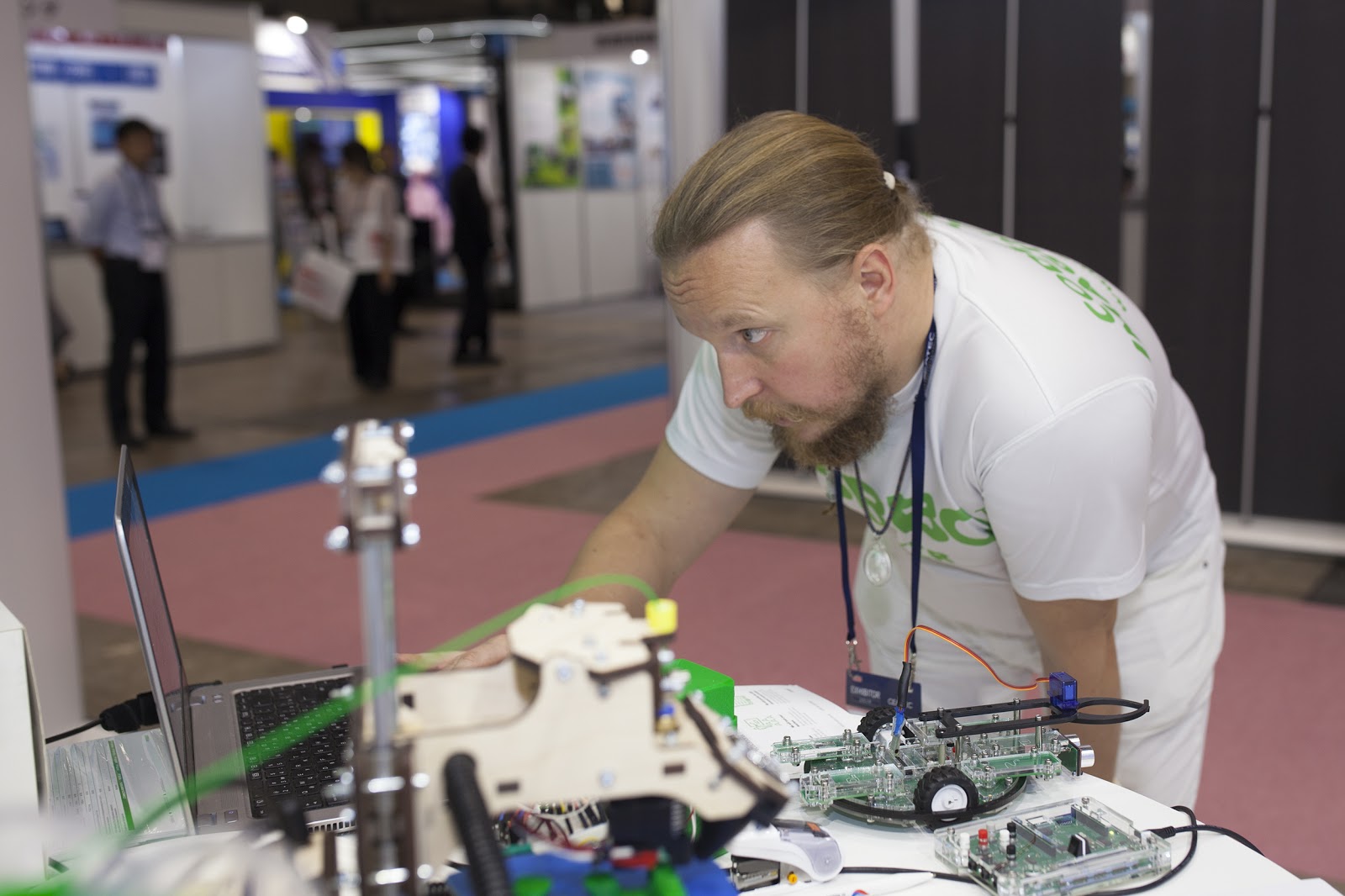
Pavel at the stand demonstrates the work of the "ROBBO Platform" and the 3D printer Mini
- Are there any kits, besides yours, that you can recommend for training?
- Right here, at the end of July, the results of the competition for the best educational equipment, which was conducted by the Agency for Strategic Initiatives and the Association of the Art Industry Market, were summed up. According to its results, 35 teaching and education means will be included in the catalog "Recommended for teaching and education of children." I can advise you to be guided by this rating. The catalog has not yet been officially published, but the list of equipment that will be included can be found in the minutes of the competition .
I recommend building your own programming kits using open source and free hardware. This is a little more complicated, but it will bring much more benefit in the future.
- Can you advise educational applications on programming, so that they (and not the parent) lead the child in the subject?
- There are no applications for Scratch, there are many programs for C ++ and C #. But honestly, I can't recommend anything.
I am convinced that it is much more effective for children to start learning programming with a good teacher and in a peer group. In a normal circle or online course, 100% of children get the result - not just knowledge, but self-written programs.
The percentage of children who can actually master programming on their own using educational simulators is very small.
More often than not, it's wasted time. You can switch to training programs in adolescence after completing a series of courses and mastering the basics of programming.
- Then maybe there is something that will help the parents not to “float” in the subject, helping the child?
- Yes, depending on the chosen field, there is a lot of literature. Here are some examples:
- our self -study guide : A self-study guide-for-teachers-and-parents-37-lessons.pdf ;
- Harvard Graduate School of Education's Guide to Creative Programming: scratch.by/news/project_news/guide_creative_programming/ ;
- by Tinkerkadu there are many lessons on the web.
But in any case, such training cannot be compared with classes in a circle (offline or online). And not even because there is less information in books and the Web, just the efficiency will be lower.
- Physics is behind robotics, but you did not mention it among the subjects that should be focused on. Why?
- It's just a matter of division into topics. For our clubs in ROBBO clubs, and now for private schools ROBBO Academy Future Skills, we have worked out educational programs, within which the necessary sections of physics are covered in courses on circuitry and microelectronics. We came from this side, since such lessons consolidate knowledge in practice. We explain what resistance, current and voltage are, not abstractly, but in action. And the child, using the experience gained, can create his own electronic device. Children begin to understand what is inside those electrical devices that they see around them, how they work, and learn to create them with their own hands. Children of the older group work directly with the "brain" of electronics - the Arduino board.
In fact, we teach so that our students can understand the essence of any device and assemble the same by purchasing in a store or 3D printing the necessary parts and elements. And I think that if you want to introduce your child to technology on your own, you have to start with this.
Why open your own schools
The further conversation is not an advertisement for Paul's schools (I will say right away: I cut out a lot of "unnecessary" things from our interview, and Paul did not seem to be offended). From my point of view, and not only mine, the school education system needs an upgrade for a long time. Here we are talking not only about new or additional directions, but also about the delivery system, methods, meaningfulness and interest. And in this regard, I was interested in a general view of the processes of teaching a person who is far from being an amateur in this matter and in recent years has just been working on opening his own schools.
- You recently announced the opening of ROBBO Academy Future Skills. What is the fundamental difference from your circles?
- ROBBO Academy Future Skills- these are no longer circles, but full-fledged schools, we call them centers of family education. They are designed for children from 5 to 15 years old. The program involves preparation for mastering the school curriculum, and then expanding the usual list of subjects with lessons in emotional intelligence, financial literacy, mathematics and English for engineers and programmers. The goal of this program is to develop thinking, intelligence, imagination, attention and memory, as well as to teach children to be financially independent.
The schools will teach humanitarian and technical subjects. After classes, students will be able to attend specialized circles. Convenience is that school and additional education can be combined in one location, already equipped with our own equipment. So children will receive a general education with a bias in IT and mathematics. And logistically it will be convenient for parents.
More recently, we launched schools in Moscow, St. Petersburg and the suburb of St. Petersburg - Pushkin. At the same time, we are launching a franchise, so we hope that schools will soon appear in other cities.
- And where to find teachers for such schools, especially if the school is a franchise?
- Our ROBBO circles have already prepared the ground for the emergence of private schools. The network already has more than 130 units, so we had to deal with the issue of teacher training earlier. For this, we have training and retraining courses developed jointly with the Russian State Pedagogical University. Herzen. And the selection system is adjusted: the salary above the market allows for serious filtering at the entrance, so that we do not drop quality.
- Are educational programs also inherited from ROBBO clubs and clubs?
- Sure. The programs are ready and have already been tested in 20 countries of the world, they participate in the programs of the European Union, they are recognized at the level of the government of Japan (we are subsidized by the opening of ROBBO Classes in Japanese schools from the state budget). 50 thousand children study according to our methods. These are “Entertaining and Olympiad mathematics”, “Algorithm and programming from Scratch Junior to Unity and Python”, “Robotics, circuitry and microelectronics”, “3D modeling and 3D printing” and other areas.
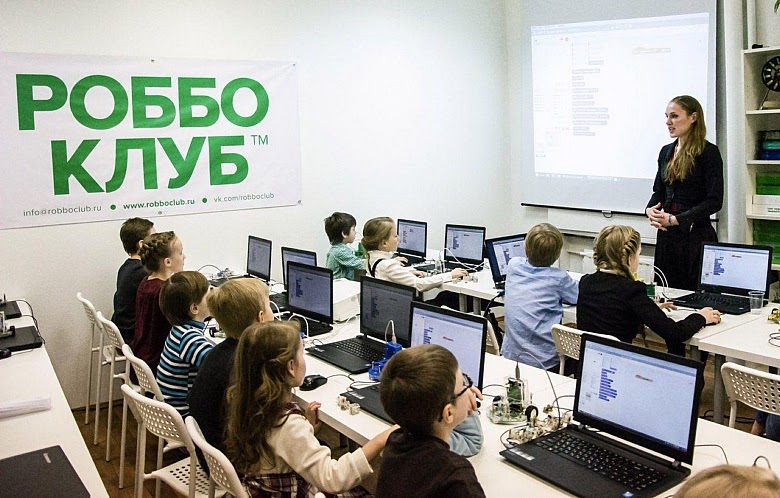
Robotics lesson with Scratch and ROBBO Platform
We have invested several million dollars in our educational methods. They are based on the principles of the Finnish education system, which is considered the best in the world, and one of its principles is that children are kind of engaged in mini-investigations. In addition, specialists from the Russian State Pedagogical University took part in the development of our methods. Herzen. I think at the moment we have one of the best programs in the world in robotics and related disciplines. And we are constantly improving it.
- Programs and teachers are not a guarantee of success. Is it necessary for the child to have a “soul” in addition to programming?
- Discipline can enthrall children to varying degrees, and that's okay. Of course, someone may like to dance more, while someone dreams of being a doctor. How passionate the child is, depends on what we get at the end - an inspired inventor or a person who is well versed in digital technologies. Both results are good. Because even doctors, teachers and all traditional professions will soon have to face the fact that digital technologies will penetrate into their sphere. You need to be prepared for this. Yes, and in everyday life it will come in handy, given the rapid development of the Internet of things. So we try to captivate the child with technology.
Why is emotional intelligence on the list of suspected items? What and how is it supposed to be taught?
- Emotional intelligence is necessary for the formation of a strong self-sufficient personality, harmoniously interacting with the world. Children with high EQ are more confident and have higher self-esteem, which contributes to independence and success in what they do.
We teach you to easily master any educational material, learn from your mistakes and draw constructive conclusions from failures, remain yourself and make informed choices in any situation, settle conflicts, not create them, emotionally charge and lead others.
What we think is important to develop: communication skills, cognitive skills, goal-setting skills and goal achievement, stress resistance, adaptation skills to new circumstances, conflict resolution skills.
It is good if these skills are developed in the family and school, but this is extremely rare. So I want to wish parents to think not only about what knowledge to give their child, but also how to develop a harmonious, self-sufficient, successful personality.